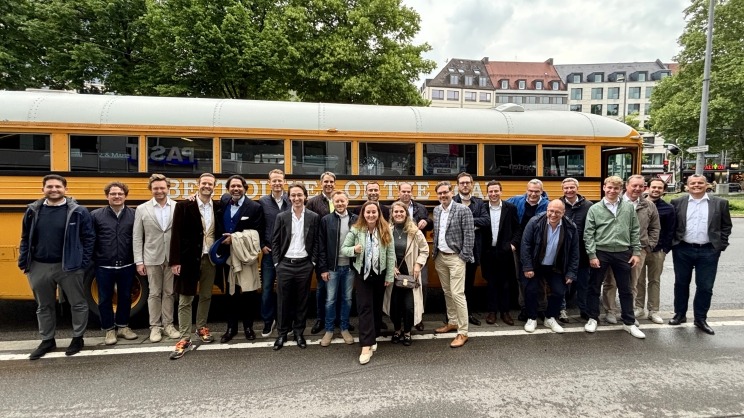Campus Spotlight: Rhea Ninan

Rhea Ninan is a consultant with Alvarez & Marsal’s (A&M) Public Sector Services practice in Washington, D.C. She earned a bachelor’s degree from the University of Michigan and a Master of Public Policy (MPP) from Duke University.
In the following Q&A, Rhea shares her insights on why she's passionate about public sector work, her effective organizational methods and what she considers to be the most vital attribute required for someone working in this sector.
What skills or experiences did you gain in college that have been valuable in your career thus far?
Group projects in school allowed me to practice working with people who have different working styles and priorities, an invaluable skill in consulting. Policy school also taught me the importance of clear and concise communication, including putting the bottom-line up front and simplifying complex information for busy audiences. Finally, balancing extracurriculars and coursework taught me the importance of organization and prioritization to effectively manage multiple responsibilities and tasks.
What led you to pursue your chosen field of study?
My grandfather was a social worker, and his dedication to public service inspired me to follow in his footsteps. While I initially considered pursuing a career in teaching or social work, I ultimately found my calling in public policy. What I find so fulfilling about this field is the opportunity to make a positive impact on a large scale, and to collaborate with like-minded individuals who have a shared passion for helping others.
Why did you choose to intern at A&M?
I was first introduced to A&M Public Sector by Abby Snyder, a fellow Duke MPP alumna. Abby shared about the meaningful work undertaken by A&M's Public Sector team, and it was through her insight that I came to appreciate how consulting can be a useful tool for driving positive change in the public sector.
Why did you choose to return to A&M full-time?
The camaraderie and positivity of the Public Sector team made a lasting impression on me and played a significant role in my decision to return full-time. The culture of mutual support is truly exceptional and has helped me manage the demands of a busy workload with ease. Whether it's through sharing the workload or simply providing encouragement, I know I can always count on my teammates to have my back. During my internship, I was able to share my interest in public assistance programs with Wanda Seiler, one of our Health and Human Services MDs, during an intern coffee chat. Wanda encouraged my interests and even connected me with a state Health and Human Services (HHS) agency, for which I completed my master’s thesis on benefits cliffs. Since my return to A&M, I have been so grateful that Wanda has continued to champion my passion for working with public assistance programs.
How do you stay organized and manage your time effectively, especially when faced with competing priorities and deadlines?
In order to ensure that nothing falls through the cracks, I abide by two organization strategies: using lists and limiting my inbox to just five emails. These strategies allow me to maintain a clear and concise view of my to-do list, enabling me to focus on successfully completing the tasks at hand.
I also consider myself fortunate to be part of a team that values collaboration and support. If I ever find myself feeling overwhelmed by my workload, I know that I can always count on my teammates to provide the assistance I need to stay on track and deliver quality work.
How do you stay current with industry trends and developments, and what resources do you rely on for ongoing learning and growth?
I am lucky to have a strong network of friends in the public sector, who provide me with a constant stream of information regarding industry trends and developments. In addition to insights from friends, I actively seek out industry information by subscribing to newsletters from organizations whose work interests me.
Looking ahead, what are your goals and aspirations for the next few years in your career?
My goal is to continue making a positive impact in the lives of those around me by engaging in meaningful work that benefits the public. I am particularly hoping to further my expertise in public assistance programs, since these programs impact some of the most vulnerable members of the public.
What do you consider to be the most important qualities for success in your field, and how do you cultivate those qualities in yourself?
One of the most critical qualities that I try to cultivate in myself is empathy. In public sector work, it's essential to demonstrate empathy towards the people who benefit from public services, the people providing public services and the people who you work with. If I ever I feel frustrated or disappointed due to unmet expectations when working on a project, I try to take a step back and remind myself to practice empathy. I firmly believe that every interaction counts, and I strive to approach each one with patience, understanding and a willingness to listen.
Did you have a mentor or advisor who has been influential in your career development, and what did you learn from them?
During a college internship at the Chicago Transit Authority, I was fortunate to work with an amazing manager, Pete Ballard. Pete not only entrusted me with interesting and important project work during my internship, but also continued to support and motivate me after the internship was over. I was especially touched when, during my first full-time job, Pete sent me an email calling me the best intern he ever had. Though I knew this was probably an exaggeration, I still pinned his email to my desk so I could glance at it whenever I needed words of encouragement.
What is your favorite hobby or activity outside of work, and how did you get into it?
Spending time with loved ones is an important part of my life that greatly enhances my well-being. Recent headlines highlighting the detrimental effects of loneliness have underscored the importance of strong social connections on good mental health. Having a supportive network of family and friends is irreplaceable. They provide comfort, encouragement and a sense of belonging, especially during challenging times.




